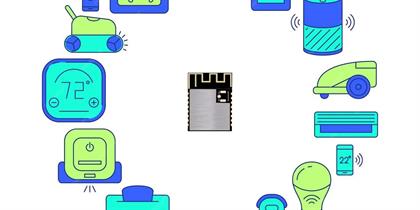
Cultivating Efficiency: The Role of Bluetooth Beacons in Smart Agriculture
September 25, 2024
In the modern agricultural landscape, the integration of technology is not just a trend; it’s a necessity. As the global population continues to grow, the demand for food outpaces traditional farming methods. This is where the Internet of Things (IoT) steps in, with Bluetooth beacons playing a pivotal role in revolutionizing the way we approach agriculture. This article explores the application of Bluetooth beacons in smart agriculture, examining how these devices are transforming the field.
The Concept of Smart Agriculture
Smart agriculture, also known as precision farming, leverages IoT technology to optimize crop production, monitor environmental conditions, and manage resources efficiently. It involves the use of sensors, drones, and connected devices to collect and analyze data, enabling farmers to make informed decisions that drive productivity and sustainability.
Introducing Bluetooth Beacons
Bluetooth beacons are small, low-energy devices that broadcast signals to smartphones or other Bluetooth-enabled devices within range. In the context of smart agriculture, beacons can be deployed to transmit data about various farm conditions, such as soil moisture, temperature, and light exposure. They can also be used for asset tracking, such as monitoring the location of equipment or livestock.
Applications of Bluetooth Beacons in Agriculture
- Soil Monitoring: Beacons can be placed in the soil to collect data on moisture levels, pH, and nutrient content. This information can be used to optimize irrigation and fertilization, reducing waste and promoting healthy plant growth.
- Weather Stations: By integrating beacons with weather stations, farmers can receive real-time updates on temperature, humidity, and rainfall. This helps in planning planting, harvesting, and protecting crops from adverse weather conditions.
- Livestock Tracking: Attaching beacons to animals allows farmers to monitor their location, health, and movement patterns. This can help in managing grazing patterns, detecting health issues early, and improving overall animal welfare.
- Greenhouse Automation: In controlled environments like greenhouses, beacons can be used to monitor and control conditions such as temperature, humidity, and light exposure, creating an optimal environment for crop growth.
- Asset Management: Beacons can be used to track the location of farming equipment, reducing downtime and improving the efficiency of operations.
The Advantages of Using Bluetooth Beacons
- Real-Time Data: Beacons provide real-time data, allowing farmers to respond quickly to changes in conditions.
- Cost-Effective: The low cost of beacons makes them an accessible technology for a wide range of farming operations.
- Energy-Efficient: Bluetooth Low Energy (BLE) technology ensures that beacons have a long battery life, reducing maintenance requirements.
- Scalability: The system can be easily scaled to accommodate a growing number of devices as the farm expands.
Challenges and Considerations
Despite their benefits, there are challenges to implementing Bluetooth beacons in agriculture:
- Signal Range: The limited range of beacons may require a dense deployment to cover large areas.
- Integration: Integrating beacon data with existing farm management systems can be complex and may require specialized software.
- Security: As with any IoT device, there are concerns about data security and privacy.
The Future of Bluetooth Beacons in Agriculture
As technology continues to advance, the capabilities of Bluetooth beacons are expected to expand. We can anticipate improvements in data analytics, the integration of artificial intelligence, and the development of more advanced sensors. The future of agriculture is poised to become even more connected, with Bluetooth beacons playing a central role in this smart evolution.
Conclusion
Bluetooth beacons are more than just a technological advancement; they are a key component in the future of sustainable and efficient agriculture. By providing real-time data and insights, these devices empower farmers to make informed decisions that can transform their operations. As the world looks for ways to feed a growing population while preserving resources, the role of Bluetooth beacons in smart agriculture is a beacon of hope for a more productive and sustainable future.
You Might Like Also

In the quest for cleaner and healthier indoor air, Bluetooth modules have become an integral part of modern air purifiers. These compact devices enable wireless communication between the air purifier and other systems, such as smartphones or home automation networks. By integrating Bluetooth technology, air purifiers can offer a range of advanced f Read More

In the modern landscape of wireless technology, Bluetooth modules have become indispensable components, enabling a myriad of applications that enhance our daily lives. These compact devices, embedded within a wide array of products, facilitate communication and connectivity with minimal effort. This article delves into the diverse applications of B Read More

The Versatility of Bluetooth Modules: Unleashing Connectivity
In the realm of wireless communication, Bluetooth modules have emerged as the Swiss Army knife of connectivity, enabling seamless interaction between devices over short distances. These compact devices have become indispensable in a variety of applications, from consumer electronics to industrial automation. Bluetooth modules are the silent workhor Read More

Enriching the Museum Experience: The Role of Bluetooth Beacons
Bluetooth Beacons are wireless transmitters that can detect the presence of mobile devices within their vicinity. In a museum setting, beacons can be placed at various exhibits to provide a wealth of information and interactive content to visitors. As a visitor approaches an exhibit, their device can receive a signal from the beacon, triggering an Read More

Bluetooth beacon used in Indoor Positioning Systems
Bluetooth beacons have become an essential component in Indoor Positioning Systems (IPS), providing accurate location data that enhances various applications within controlled environments. In smart retail settings, beacons play a crucial role in enhancing customer experiences, optimizing store operations, and driving business insights. Read More

The role of Bluetooth beacons in RTLS
Bluetooth beacons are playing an increasingly vital role in Real-Time Locating Systems (RTLS), particularly within the context of warehouse management. These tiny, yet powerful devices, are redefining the way warehouses operate, offering a new level of efficiency and precision that is transforming inventory tracking and asset management. Read More











